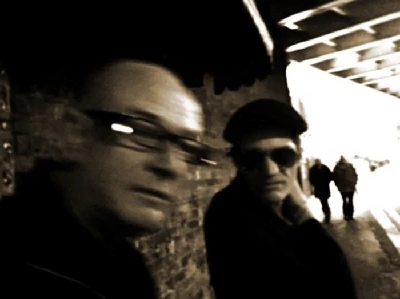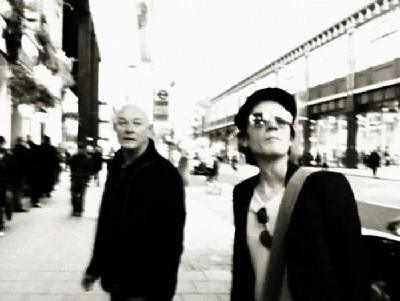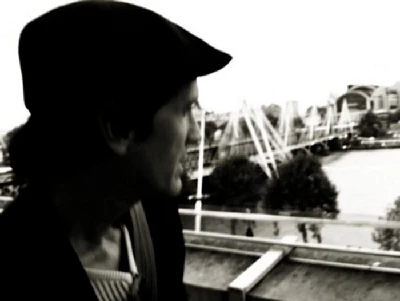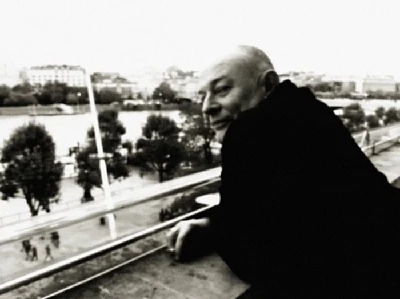published: 16 /
4 /
2012

The White Space is the new band of Robert Vandeven from the Lucy Show and Fuzzy Logic's Dave Farrow. John Clarkson speaks to both of them about how it unconsciously became a concept album, and why they are unlikely to play it live
Article
In Michelangelo Antonioni’s 1970 art house film and oddity, ‘Zabriskie Point’ about the then American counterculture, its brief lovers, Mark and Daria, make love in the well of the Death Valley desert. In what was then a highly controversial piece of filmmaking, the camera cuts away to show dozens of other dust-covered naked couples also love making amongst the desert’s sands and rocks.
The London-based two-piece the White Space have created short films to accompany each of the nine songs on their debut album, ‘The Crescent Wave’, and have used that scene and other segments from ‘Zabriskie Point’ to illustrate ‘Davey’, one of the songs on that album.
For ‘All The Flowers’, one of the darker latter songs on the album, they have used clips from ‘Soy Cuba’, a 1964 Russian propaganda film, and the final vibrant scene in ‘Zabriskie Point’ in which, after Mark has been shot dead by the cops, Daria imagines, amidst images of slow motion flames and exploding consumer items, blowing up her boss‘s lavish hilltop home. ‘Hold’, the nihilistic last track on ‘The Crescent Wave’, is meanwhile enhanced by footage from French director Alain Resnais’s enigmatic and dream-like 1961 film of classic existentialism, ‘L'Année dernière à Marienbad’.
“I was just blown away by the huge majesty of the desert landscapes and its colour,” says the White Space’s guitarist and keyboardist Dave Farrow about ‘Zabriskie Point’ and his group’s choice of visuals. “It was something similar with ‘Soy Cuba’. It is beautifully made. I saw ‘L'Année dernière à Marienbad’ one afternoon on TV without knowing too much at first about its historical significance as a piece of French existentialism. I just thought it was the most beautiful looking thing that I had ever seen. I thought it was stunning.”
One can see the appeal to the White Space of all three of these films. ‘L'Année dernière à Marienbad’, in which an unnamed man and possibly married woman debate over whether they met and had an affair the year before at Marienbad, is set in a magnificent chateau. ‘Soy Cuba’, a film about the pre-Castro class divisions of Cuban society, takes place in the American-run gambling casinos of Havana and their nearby shanty towns and sugar cane fields. Like ‘Zabriskie Point’, the only colour film of the three, ‘L'Année dernière à Marienbad’ and ‘Soy Cuba’ are, as Farrow says, striking to look at. All three films, while at one level rooted in reality, are also larger than and heightened from life.
Much the same could be said about ‘The Crescent Wave’. Monumental and epic in size, it is an album that is absolutely gorgeous in sound, a very solid piece of near symphonic rock. Singer and guitarist Robert Vandeven’s crooned vocals and swooning melodies are combined with hazy, guitar lines and exaggerated synthesised strings to create a record that is initially uplifting. As ‘The Crescent Wave’ progresses, it, however, moves away from hopeful optimism on its early tracks into something progressively more bleak. The music, although remaining always meticulously presented, shifts in tone as well. While the first three songs, ‘Stay’, ‘Davey’ and ‘New Day’, are conventional pop numbers, the remaining tracks become increasingly experimental and avant-garde.
“You say you know all the reasons/You have all the answers in the palm of your hand…,“ spits Vandeven venomously at an ex-lover on the sixth track, the sombre ‘All the Flowers’. “But all I see is a wounded prisoner/Another lamb to the slaughter/Just a heaving animal/Who holds nothing at all.” It is in complete opposite to the sunny opening track, ‘Stay’, and the seemingly indefatigable hope of its chorus line of “If you stay with me, I’ll stay with you.”
And after ‘All the Flowers’, it becomes even blacker still. The eerie, unsettling ‘Simbday’, with shimmering electronic beats and a falsetto vocal from Robert Vandeven, tells of a breakdown (“Oh lord/Oh god/I'm breaking down again/Long black train comes/Long black cloud/Knocks you sideways/Takes your lights out/All I have can't save me now“).
The final two songs, the brooding title track (“Funny how life got in the way/Then turned it around/But there's not much to say/That’s just the way”) and the last song, ‘Hold’, herald an acceptance of what has gone. As the soaring ‘Hold’, a slow-surging orchestral number of enormous proportions, reveals, the naïve rosiness of the early tracks has entirely gone and been replaced by a world weariness and despair at the seeming futility of life (“You hang your head/The wasted years/Across your bed /You hold this life/And you say you know/But you don't know /You don't know”). The effect of ‘The Crescent Wave’ and its final pay-off is breathtaking.
“It wasn’t intentionally planned as a concept album,” says Vandeven. “We came up with the tracks and decided what we were going to keep and not keep as we went along. In hindsight and looking back it probably does have a theme running through it, but that is more to do with something unconscious. I think that it does reflect both where we were and what we felt at the time, but I think that if there is any kind of thread running through that it is because it happened naturally. It wasn’t something that Dave and I agreed to do. We didn’t set out to make a concept album, but looking back it is not surprising that it does come across as that.”
Both Robert Vandeven and Dave Farrow have long backgrounds in music. The Canadian-born Vandeven, who has been interviewed by Pennyblackmusic before, was the bassist, (and one of the two vocalists with Mark Bandola being the other) in the 1980’s cult act, the Lucy Show. They recorded two acclaimed albums, ‘...undone’ (1985), which went to number one in the CMJ college radio charts, and ‘Mania’ (1988). Having already been dropped by one label A &M, they, however, broke up after their second label Big Time Records went bust. Vandeven then went on to play with and to front an assortment of other groups, including Zero Zero who released a solitary album, ‘Ava’, in 1996, before taking a long sabbatical from music which only came to an end when he released his debut solo album, ‘Lost Days’, in 2009.
Dave Farrow, a Mancurian, played bass with and appeared on ‘Life on the Telephone’, the 1982 debut single of Flag of Convenience, guitarist Steve Diggle and drummer John Maher’s band after the Buzzcocks originally broke up. After leaving Flag of Convenience and moving to London, Farrow formed Fuzzy Logic, whose song the William Orbit-produced ‘Obsession’ was a house hit. He has since then worked with a variety of dance and indie acts.
Dave Farrow and Robert Vandeven met when they were introduced by their mutual friend, former Lucy Show guitarist Peter Barraclough, who now runs a recording studio in South London, which Farrow was using regularly. They formed the White Space in 2010.
“We were trying to get a grandiose feel to a lot of the tracks,” says Farrow, discussing the album’s recording. “The majority of the album was songs or ideas that Rob had, and which I then embellished on.”
“Dave came up with both ‘Stay’ and ‘Hold’ and both of those remained pretty much as they were,” adds Vandeven. “Beyond that there was a lot of back and forth. Dave would take something away of mine, bring it back with something added on, and then I would build on it again, and then Dave might add something to that. We experimented around a lot, and did things over and over again. What mattered to us to was that it felt right, so we spent a lot of time with stuff - arrangements and whole songs - that eventually for one reason or another we ended up completely dumping.”
‘The Crescent Wave’ was recorded largely by just Vandeven and Farrow in the former’s home studio, with occasional guest appearances from friends, including Pete Barraclough on one track, ‘Ships’, and Danny Griffiths from the South London electronic band Archive on another three songs. Both of them provided additional keyboards.
“We are not in any position to do so at the moment,” says Vandeven when asked if the White Space plan to play live. “We would love to at one level. People have said to us, ‘Take it out and do an acoustic set’, and I think that would work in certain scenarios, but, if we were going to do it, I would want to take it out and do the whole thing with a band.”
“This album has a very particular sound to it, and ideally we would need an orchestra playing,” he laughs. “We are working on more material at the moment, and maybe once we have got more tracks under our belt we will look at the situation again.”
Vandeven and Farrow chose the name of the White Space for their band, and which was also the title of the B side of an early Lucy Show single, as it implies to them an unwritten page or blank canvas. While the album is ultimately melancholic and bleak, they are both optimistic and excited about the future.
“There is a lot of despair on the album,” admits Vandeven. “But I wouldn’t really tie up the band name with the record. We chose the name, ‘The White Space’, because to us it has a lot of hope in it. I feel really positive about what we can achieve with this project and where we can go forward with it.”
“It does feel that there are so many other things we can do,” agrees Farrow. “We have got a lot of other ideas and are already starting to work to them.”
With work on a second album having already begun, neither Vandeven nor Farrow are certain yet what kind of direction it will go in.
“I think it will evolve in its own way,” says Farrow. “I can’t see it from what we have got so far it being quite as melancholic as ‘The Crescent Wave’. I don’t think that either of us would want to do that again.”
“What a lot of the band is about is just seeing how we develop and what we come up with,” concludes Vandeven. “Things are changing and moving on constantly. We are both really enjoying it.”
In a superb piece of symbolism, other shots in the White Space’s montage of films to accompany the album reveal a group of 50’s starlets parading in front of a stream of paparazzi on a beach; planes taking off into the night sky, and in a reoccurring theme footage of both slowly shaping patterns of cloud, and also Earth and the planets taken from a spacecraft. Likewise, the White Space seems to be a band of endless possibilities.
‘The Crescent Wave’ will be self-released both on CD and also digitally on the band’s own Ava Records on the 15th May. More information about the White Space can be found at www.thewhitespaceoffficial.com
Picture Gallery:-


